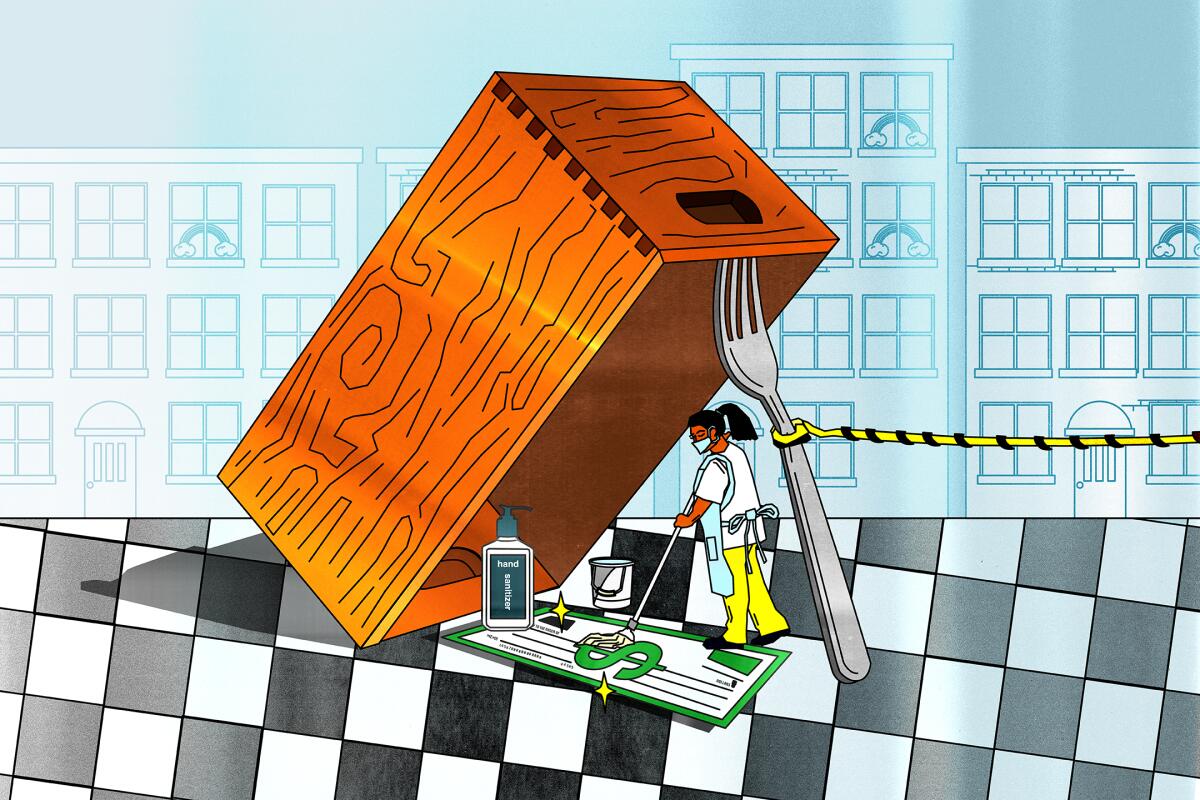For some restaurant employees, reopening is a lose-lose proposition

- Share via
A little over three months ago, Alexander Galvez was waiting tables at Yamashiro, the storied hilltop restaurant known for its spectacular Hollywood views that began life as a massive Asian-inspired estate in 1914. When Yamashiro began preparing to reopen after the shutdown, Galvez hoped to be offered his old job back. What he didn’t expect was that Yamashiro wanted him to have turned into a handyman.
Working in the restaurant industry has never been easy. But as L.A. and other cities across the country chaotically attempt to go about business as usual, restaurant servers, hosts and bartenders on the front lines of the reopening are particularly at risk.
“I’m concerned I might get sick, but I feel like there’s no choice,” said Galvez, who worked for four years at Yamashiro. “I’m scared, to be honest. But we have to pay bills.”
Most restaurants try to look out for their employees. But Galvez and other workers at Yamashiro say an already stressful predicament has been exacerbated by the restaurant’s job offers — offers that seem to test the boundaries of what “good faith” is.
I spoke to multiple former Yamashiro employees, all of whom claim they were made decidedly bad-faith offers of employment by the restaurant, forcing them to either accept an unsuitable job or risk losing their unemployment benefits. The experience, many said, has left them feeling confused and devastated, and made an already stressful situation even worse.
Former front-of-house staff, including bartender, host and server employees, told me they received emails from Charles Mills, Yamashiro’s director of operations, with offers to return to the restaurant, as well as a statement that Yamashiro had received funding from the Paycheck Protection Program, a government loan program designed to help small businesses weather the shutdown.
But the jobs weren’t what they expected — or the jobs they had departed from. Instead they were maintenance positions — doing things like plumbing, HVAC and electrical work. The offer required that employees sign a document affirming they had proper qualifications for the jobs, which included stipulations such as having prior experience with carpet shampooers and pressure washers and being able to lift and move more than 100 pounds.
“I’m 5 feet 5 inches and 125 pounds altogether,” said Alisa Gerstein, who began working as a server at Yamashiro in 2017 and was offered a maintenance job. “I could never do that. It was clearly just a crazy offer.” She said she called Mills to complain but was told it was the only position available.
Gerstein said she was shocked, then, to see posts for front-of-house positions at Yamashiro on Indeed.com. Screenshots of the website show a solicitation for bartenders, bussers, runners and servers. She had turned on notifications for server positions and received an email from Indeed telling her she should apply to work at Yamashiro. “It was just appalling,” she said.
Restaurant workers have taken the full brunt of the shutdown’s impact, suffering not only from potential health concerns but financial fallout — nearly 6 million restaurant jobs have been lost, according to a report released by the Independent Restaurant Coalition.
To help make up for lost wages, the Federal CARES Act included an additional $600 per week for the unemployed, a benefit the government will provide through the end of July. As restaurants reopen in the limited capacities they can, they are offering former employees some version of their jobs back, because they need the labor and/or because provisions in the PPP require restaurants to do so to exact the maximum benefit for themselves.
But the choice to go back is fraught: Workers can return to a high-risk environment or, by refusing an offer of work, possibly lose unemployment benefits. With some restaurant workers making as much — or more — on unemployment as in their jobs, the threat of losing that money is a real worry.
The key provision of the PPP allows for loan forgiveness if a given percentage of the money is used to pay employees — in which case, the loan becomes essentially free money for the restaurant.
A caveat in the payroll rule allows for “loan forgiveness reduction for borrowers who have made a good-faith, written offer to rehire workers that was declined.” In other words, employers must make an honest attempt to hire back their employees. If the employees refuse, that’s not the fault of the business in the PPP’s eyes.
For Galvez, the motive to offer seemingly unsuitable jobs is apparent: “It’s a win-win for them. They get to clean house and keep a portion of the loan,” he said.
“What’s troubling about it is, they knew they were putting us in a position to say no,” said a former server who did not want to be identified for fear of losing other employment opportunities.
“Even if we were to say yes, we’d have to sign that job description,” she said. “They could say, a week from now, ‘You’re not doing the job very well. You don’t seem to have the qualifications you said you had.’”
Days after being asked to step into a role in which she had no experience, she said Yamashiro sent her a letter stating she had turned down the job — a step it would need to complete to prove it had made a good-faith offer.
Former Yamashiro bartender Aaron Polsky said that six days after getting a maintenance job offer, he also received an email noting that his turning it down “may impact state unemployment benefits.” He called the company “unprofessional and uncompassionate.”
“Absent good cause, refusing to return to work in many cases will disqualify you from collecting unemployment,” said Emanuel Shirazi, owner of Shirazi Law Firm. Exceptions could be made if, for example, the job was unsafe. “The devil’s in the details — what is ‘unsafe?’” Shirazi said. He said California’s Employment Development Department likely would look at whether the restaurant was in compliance with state and local guidelines.
But for Yamashiro employees, that’s little consolation. “I have to accept something completely unsuitable, or I have to decline it and take up an appeal with the EDD,” said one hostess, who did not want to be identified for fear of retribution from the company.
Yamashiro’s Mills, who sent out the maintenance job offers, did not respond to a request for comment.
The entire experience has left Gerstein feeling worried and disillusioned with the industry. “Restaurant work feels so unstable,” she said. And above all, she feels a great sense of disappointment. “It’s really heartbreaking I won’t be able to be in that beautiful building.
“I would have been back there in a heartbeat,” she said. “I really loved this job.”
More to Read
Eat your way across L.A.
Get our weekly Tasting Notes newsletter for reviews, news and more.
You may occasionally receive promotional content from the Los Angeles Times.











